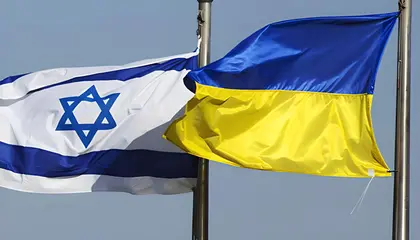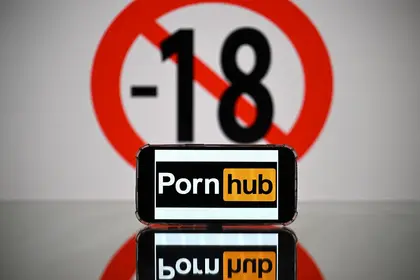Since the recent attacks by Hamas terrorists on Israel began, there has been an outpouring of solidarity from Ukrainians – from the country’s President to diaspora community organizations in the US, Canada and Australia to the person in the street in Kyiv and Kryviy Rih – for their Jewish friends.
Now, President Zelensky has asked to travel to Israel and called on other world leaders to do so to show support.
JOIN US ON TELEGRAM
Follow our coverage of the war on the @Kyivpost_official.
War is indeed hell, but it can also give rise to what Abraham Lincoln called “our better angels.” Such is the case with Ukrainian-Jewish relations now. The unprecedented unity we see is contemporary, but it also has important historic reasons, including some I have had experience with.
One substantial contemporary reason for Ukrainian solidarity is, of course, basic human empathy. Ukrainians – after nearly two years of vicious and unilateral war crimes on the civilian population – see Israelis being subjected to very similar barbarism in the last week. This include the single deadliest day in Jewish history since the Holocaust and the kidnapping of vulnerable people by Hamas, a tactic similarly gruesome to the international war crime Putin is specifically charged with in the case of the forcible deportation of some 20,000 Ukrainian children.
Jews and Ukrainians are now two peoples confronted by parallel plans to literally – not figuratively – erase their independent nations and distinct cultures; theirs is now a parallel fate of defending their respective existences.

‘Just Peace’ and ‘Lasting Peace’ – Nations React to Trump’s Inauguration
Another reason for strong solidarity is the recognition of the risks of shifting geopolitical plates. A direct and deadly fault-line runs through Hamas and its evil collaborators, their Iranian backers, and Tehran’s major ally, Moscow.
These are organizations and regimes: who have made genocidal hatred and unilateral violence into their cornerstones; that are run like Mafia gangs for the benefit of narcissistic and corrupt elites; and who thrive in cultures demented by digitally driven delusions. The West’s barricade against new-fashioned fascism stands from between Kyiv and Jerusalem.
Additionally, after more than three decades of migration and human ties, Israel and Ukraine now share bi-national families, diasporas, organizations, business interests and religious institutions. Hundreds of thousands of Jewish Ukrainians and Ukrainians in Israel know and well regard each other, and this, of course, brings forth solidarity.
The world’s largest Jewish diaspora religious migration takes place every year in Uman in central Ukraine – where Russian missile attacks have killed dozens of local residents in their sleep.
What needs to be understood is that this new Jewish-Ukrainian solidarity has risen like a positive phoenix from a history that has been dark and deplorable at times. Today’s unity and common purpose are even more significant for what they have emerged from and what they have overcome.
As one illustration, let’s look at Rohatyn, my ancestral town in Ivano-Frankivsk region and its experience of World War II. Then, it was sad epicenter of the Shoah – or the Holocaust by Nazi bullets.
On March 20, 1942, more than 3,000 adult Jews and 600 Jewish children from a local ghetto – which verged on a 15th century Ukrainian church – were murdered by the Nazis. It is incontrovertible: that some local Ukrainians collaborated with a Nazi SS unit in the round-up, execution and burial of Jews in a mass grave; that a small number of locals tried to save Jews from death then and later during the Nazi occupation, and; that probably most Ukrainian Rohatyners sadly looked away.
That massacre, another major one in June 1943 of Galician Jews herded into Rohatyn, and other killings of local Jews occurred after four centuries of multicultural co-existence, cooperation and occasional conflict between Ukrainians, Poles and Jews in the town and the region.
My father’s first “job” was as a “Shabbat Goy” – a young Christian boy who lit stoves for the town’s Jewish residents (40 percent of the 8,000-strong pre-war population). This was part of deep traditions and genuine neighborliness – which ended with the Holocaust that left only 100 Jewish families alive in Rohatyn.
From that complex and somber past, the present story of Jews and Ukrainians in Rohatyn and elsewhere is, by contrast, one of triumphant tenderness. Through honesty, kindness, atonement and action, 21st century Jews and Ukrainians were increasingly experiencing a historic reconciliation prior to Russia’s full-scale invasion.
Honesty about history has let Ukrainians and Jews stand together in their time of shared need as perhaps never before. This is in stark contrast to the fascist ideologies and propaganda that drove division and death during World War 2 or that Putin now tries to use for the same goals – be it in Ukraine or via his Middle Eastern minions.
As a wonderful example of honesty and its restorative power, in my “selo,” the Rohatyn Jewish Heritage NGO – led by the remarkable Marla Raucher Osborn, an American expat from California – documented some 400 years of history lost to the Shoah and then Soviet oppression; created inclusive commemorations with local authorities and residents; built new bridges across cultures, continents, and generations; rebuilt cemeteries destroyed by the Nazi’s; and shared empowering and healing knowledge with thousands.
Osborn, her volunteers, town authorities, the schools, and locals came together because of the painful past but have bonded as new friends and new neighbors. I make out that, as old Jewish gravestones – desecrated and deployed as construction material – were dug out from beneath Rohatyn’s roads, Osborn and her new local connections saw their shared humanity, including its flaws, frailties and aspirations. Each other’s “better angels.”
Marla and her intrepid husband, Jay Osborn, moved to Lviv for their retirement and have been there for most of the full-scale war. They live their lives, they do their voluntary work in Rohatyn, and they resist Russia as so many Ukrainians do: by being normal. Many have come to love Marla’s social media posts of “giving the finger” to air raid sirens caused by the aggressor’s aerial assaults.
Of course, reconciliation, of which Rohatyn is a dignified microcosm, is very publicly symbolized in Ukraine’s allegiance to and admiration for the country’s democratically elected Jewish President, one of only two in the world. However, as this visitor to Ukraine’s frontlines or war-time institutions knows, reconciliation and inclusivity is also reflected in the extraordinary sacrifice of Ukraine’s Jews as soldiers, doctors, humanitarian activists, businesspeople, writers and many others who are part of the collective defense of sovereignty and democracy against a morally denuded and hate-obsessed aggressor.
It’s my view that Jews choose to serve Ukraine because many Ukrainians have confronted their repugnant prejudices, offered atonement, and now fully respect and regard Jews as compatriots, fellow citizens and huge contributors.
I think of Ukraine’s Chief Rabbi bravely delivering humanitarian aid to victims of the forced floods at Kakhovka while under incoming Russian shelling.
Whether its Marla fighting on her front, or thousands of Jews and Ukrainians in Ukraine fighting on theirs, none of this would have been possible if two cultures – intricately intertwined but sometimes destructive toward the Jewish partner – had not resolved much of the past to face the present and future together.
While it is awful to watch senseless slaughter in Israel or Irpin or Izyum, it is also heartening and hopeful to see Ukrainians and Jewish unity. It shows that wisdom and good can prevail.
What has brought these peoples together is not only shared pain; it is emotional integrity, historical candor, atonement, and the recognition of mutual humanity and democratic values. And, those are lights on the path to peace for both Ukraine and Israel and their common victory over lies and loathing.
The author thanks Jay Osborn, Marla Raucher Osborn and Ross Abelow (of the Park Avenue Synagogue in New York) for their input.
The views expressed in this opinion article are the author’s and not necessarily those of Kyiv Post.
You can also highlight the text and press Ctrl + Enter










